Being Regional for a Reason
Investing in Playwrights as Community Builders
This is the first in a series of blogs that will chronicle the birth and infancy of New Play Frontiers. I will share the origins of this program, its impact on our organization, the process of selecting playwrights and community partners, as well as the discoveries we make during the residencies. Beyond reporting out, I hope this series will spark further conversation about the different motives for theaters offering playwright “residencies.” Who are we most trying to serve? What responsibility, if any, should “playwrights-in-residence” have to the individuals, organizations, and communities funding and supporting their work? And how can visiting playwrights participate in an institution’s effort to celebrate their regional identity?
Origins of New Play Frontiers
After nearly twenty years working in New York City as a playwright, director, and co-leader of Epic Theatre Ensemble, my family and I moved to Pennsylvania in September 2011 so I could join People’s Light & Theatre in Malvern, PA, forty-five minutes outside of Philadelphia. People’s Light and Epic share a kindred dedication towards integrating professional theater making, extensive arts-education, and civic-engagement. The scale and setting of People’s Light, however, was a radical departure for me—a leap into the unfamiliar territory of the “regional theater” and with New Play Frontiers I’m splashing into the deep end.
Utilizing a cross-departmental committee and a newly constructed eHarmony-like database to match playwrights with community partners, New Play Frontiers is an initiative designed to conceive, develop, and produce plays that explore our American identity through stories of deep meaning to specific populations in the five-county region surrounding People’s Light. Starting in April, the first six playwrights participating in this program will begin their multi-week residencies, embedded in local communities to inspire their new work. They are Eisa Davis, Colman Domingo, Kate Fodor, Karen Hartman, Dominique Morisseau, and Kathryn Petersen.
More than just the first official new play program in our theater’s thirty-eight year history, New Play Frontiers is an investment in cross-sector partnerships, community reciprocity, and organizational re-invention. It is a company-wide commitment to placing playwrights and their work at the center of a long-term strategic plan to expand and diversify our audiences, donors, and staff. It is big and thrilling and daunting. It is an experiment filled with good intentions and unpredictable outcomes. Our aim is to improve the artistic and financial health of People’s Light, to enhance our local relevance, as well as contribute to the national conversation about new play development, artist value, and civic purpose. We will succeed if the relationships we establish between writers and local populations, between our theater and community partners are mutually beneficial and offer the opportunity for ongoing interaction and support. We will also succeed if the seasons we program in the future look nothing like the seasons at other regional theaters, but do resemble the communities we serve in our distinctive part of the world.
Motivations
There are many motivations for New Play Frontiers: artistic, financial, personal, and institutional. A combination of fear and opportunity might best describe the project’s genesis. Fear because the audiences and donors responsible for our theater’s growth over the past four decades may not be dying yet (although some are), but they are certainly more restricted economically and physically. They are unable to sustain us. Opportunity because People’s Light is located in a part of Pennsylvania where it is clearly possible to cultivate a new generation of loyal and active supporters. We can envision another forty years, but it requires a massive institution-wide investment in providing experiences that embrace and embody the diversity of our region.
People’s Light is in the heart of Chester County at a fascinating intersection of rural, suburban, and urban communities. One of the fastest growing and wealthiest counties in America, Chester’s abundance coincides with expanding poverty and hunger. Along the nearby “Route 202 Corridor” there is both an explosion of start-ups in the information technology and financial industries, as well as multiple generations of migrant workers in the mushroom fields of Kennett Square. Colleges have spread like dandelions: Villanova, Bryn Mawr, West Chester University, Immaculata University, Swarthmore, and UPENN, to name just a few. Hospitals are equally prevalent. On any given day, my drive to work includes passing arboretums, farms, horses, deer, Target, Starbucks, abandoned factories, historical societies, senior living facilities, Valley Forge, The Vanguard Group, King of Prussia Mall, gas pipelines, Main Line mansions, Quaker Meetings, The Constitution Center, The Liberty Bell, and beyond. This area is a crazy quilt of which People’s Light occupies a central square.
Our seven-acre campus includes two buildings, a storage facility, a small creek, picnic area, hidden playground, and tons of free parking. One building is a converted eighteenth century Farmhouse that houses our Main Stage, banquet room, bistro, and thirteen units of artist housing. Some of the original walls, beams, and fireplaces remain intact. The other building, while less easy on the eyes , contains a 160-seat black box theater, our shop and production
headquarters, administrative offices, two rehearsal rooms, and multiple classrooms for our extensive arts-education programming. Understanding our setting is key to understanding the origins of New Play Frontiers. We have the space and are geographically situated to be a gravitational center for theatrical experiences (productions, classes, readings, outdoor happenings) that bring diverse economic, ethnic, and social populations together. We can serve families, students, and seniors. We can explore this dazzling, lunatic world we are all part of through a variety of perspectives and languages, and as a result be a truly “regional theater.” We can, we do, but at this moment not yet to the degree that assures our future cultural relevance and organizational health.
We will succeed if the relationships we establish between writers and local populations, between our theater and community partners are mutually beneficial and offer the opportunity for ongoing interaction and support.
So how do we seed the long-term relationships that will be at the heart of our company’s future? People’s Light continually experiments with ways to invite our neighbors to engage more frequently and vitally with us. Voting now takes place in our lobby. We revamped our banquet room into a go-to event space for weddings (even one that Al Gore attended), birthdays, business retreats, charity galas, and late night cabarets. With our “Community Matters” series, we partner with non-profit organizations to present free staged readings of new plays that serve as a catalyst for discussion about local issues such as veteran health, autism, sports-related head injuries, and public education. While all of these activities are important, our eight productions and year-round education programs most determine our identity and value for the communities of our region. It is these productions and programs that will inspire the relationship building and future of our organization.
New Play Frontiers emerges from this institutional reckoning. It also emerges from a major re-think regarding the role of playwrights and play development at People’s Light. In my next post I’ll explore the origins of this shift.


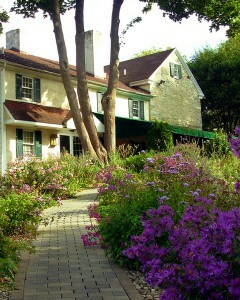
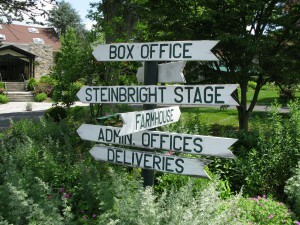
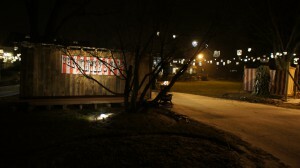
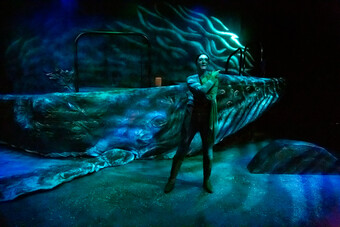

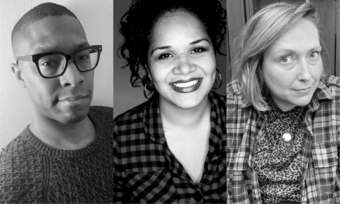




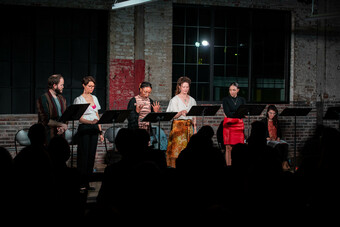

Comments
The article is just the start of the conversation—we want to know what you think about this subject, too! HowlRound is a space for knowledge-sharing, and we welcome spirited, thoughtful, and on-topic dialogue. Find our full comments policy here
Zak, this is inspiring. Good luck with it all. I cant wait to come and see the first main stage production by one of your embedded writers. Very exciting- enjoy the "deep end" it's where the most freedom and buoyancy is.
Simon
Christine, you ask a lot of vital questions. I hope as my series continues many of your questions will be addressed -- perhaps in ways that may not fall neatly into any previous paradigm, but addressed nonetheless. What is worth underscoring here is that I am a playwright/director/dramaturg and that People's Light is led by an Artistic Cabinet of 8 artists (directors, designers, writers, dramaturgs, choreographers, and teaching artists) as well as employing a full time costume designer and numerous artisans. A number of our actors have been working consistently with us for three decades. So the directionality of our decision making is often artist-guided if not artist-steered and the genesis of this project is certainly informed by our being artist-centered.
I would, therefore, hold off making too many guesses or assumptions about our dynamics just yet. I fully understand and appreciate your concern and skepticism, and it may be that as I share our story -- both in how we got here and what we end up discovering along the way - it may validate those potential "shadows" you highlight. But if I've learned anything from my first 18 months here at People's Light is that it rarely mirrors any other models and fits few pre-existing molds.
Anyway.... I hope you'll keep reading. And thank you again for posting your comment.
Sounds very exciting! I do have some questions though, about the shadows this sunny picture might also cast. As a playwright, I'm tracking the move towards residencies, and "embedding" writers in community, with deep interest (bearing in mind the conflicted resonance of the word from recent reporting of the war in Iraq.)
One of my recurring questions about playwright residencies is: How can power relations between playwrights and theaters shift? Certainly being in residence will make writing a day-job and make the writers visible to the other workers and the community. It is likely to create bonds, uncover new stories, and create wonderful new connections between people and histories in the area and the theatre and its artists. All that is great.
But I also have some reservations and questions. The first is that the process of selecting these playwrights or inviting them, remains as stubbornly opaque as it does in all theatres where staff get paid. ("Starting in April, the first six playwrights participating in this program will begin their multi-week residencies, embedded in local communities to inspire their new work.") This leads me to surmise that relationships already in place, brokered by the theatres not the writers, are the source of these residencies. So back to my question: How can the power relations between playwrights and theatres shift?
This leads to my second question which is to do with art and instrumentalism. A real dialogue between audience and artists is obviously a Good Thing. But I wonder whether the "fear" part of the fear/ opportunity nexus Zak describes here will drive worthy, useful, journalistic writing? I missed the part of this post that says that artists' unique, singular and perhaps disruptive vision is in and of itself, something People's Light value and seek out. This seems part of a larger problem to do with not-for-profit "missions" to inform and educate-- a different notion than that of art as a civic value in its own right, for its power to disrupt, estrange, shock, critique, re-frame, astonish, and create transcendent rupture. To fundamentally change how things look and mean. In other words (following Polly Carl's recent post on docile bodies)--will the structure of these residencies itself make the writers both more useful and more docile? Or will they simply be offered to writers who are already "a good fit"? (i.e. I don't imagine a Sarah Kane here.)
Maybe this doesn't matter, and putting bread on the table is the first priority in this arts-funding starved country. Sometimes it really is--and the further from the back-up of white and monied privilege one moves, the truer that becomes. But it sometimes sounds like writers are being let into the building as an absolute last resort, to help the paid staff keep their jobs as the theatre dwindles into perceived irrelevance. I do not think it's the job of the artist to serve in that way, though I do believe that the singular and sometimes strange and shocking vision of the artist is (in all senses of the word, including the dangerous echo of the German "poisonous") a gift.
My last question: What can only art, and artists, do? Because building community relationships and serving audiences can very well be done by committee, just as reporting from "embedded" military units can just as well be done by Army PR people.
Very interesting, Zak. Like all the others, I look forward to reading more about it and following your journey. thanks for bringing us in!
Like the others here, I'm looking forward to following along on HowlRound. Thank you for bringing us into the experiment with you!
Let's try to make that happen, Michael. I'd love to find more ways of integrating elements of your call to civic action and service during the TCG convening into this program. And thank you Julie, Richard, Kittson, and Jenny! It's bizarre to begin reflecting on this at such an early stage of the program, before the writers have even gotten here, but in the big picture I think it'll be interesting to share the evolution of the project and People's Light this way (at least it'll be useful for me).
Lets talk soon, Zak. I have some ideas, and would love to learn more about how the partnerships are developing.
This is pretty cool. I want to come visit.
So excited to read this. Had a great time talking with you about it when you visited. More more! And I hope we can be involved.
Zak, a great concept and location to implement it! And putting the playwrights' residencies and resulting work at the core is hopefully a model more regional theatres will borrow from People's Light. Looking forward to your updates.
Zak, I really look forward to seeing what you create! It is a perfect location to really mix things up.
So interesting Zak! thanks for sharing and I look forward to hearing more!